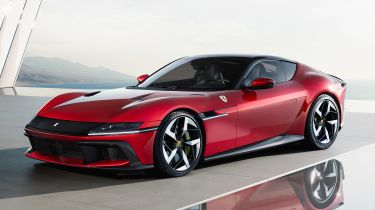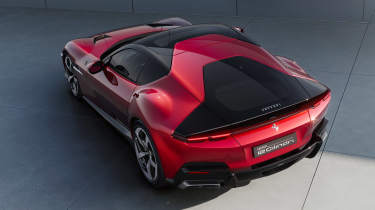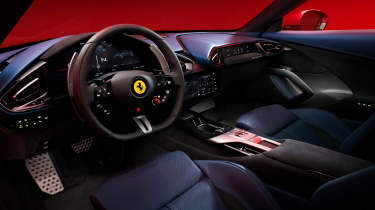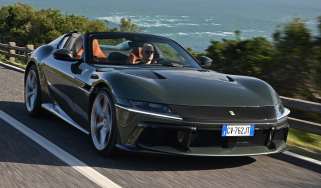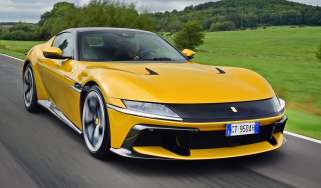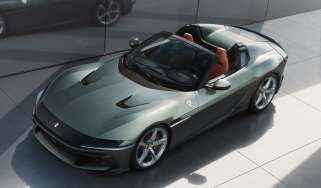Stunning new Ferrari 12Cilindri confirms there's still a place for a big V12
The next chapter in Ferrari’s 12-cylinder dynasty available in coupe and Spider forms from launch
This is Ferrari’s new series-production V12 supercar, designed to replace the 812 family with a package that’s both modern and retro in one fell swoop. Called the Ferrari 12Cilindri, it eschews the notions of downsizing and electrification for the sake of a traditional combination of cubic capacity and natural aspiration – matched to the cutting edge in raw mechanical engineering in all aspects of its technical package.
Destined to cost somewhere in the region of £400,000, the new ‘dodici-cilindri’, as the Italians would prefer you call it, will be available in both coupe and Spider forms from the fourth quarter of this year, the latter version replacing the popular 812 GTS.
The engine
As with all Ferraris, it’s the powertrain which always dominates proceedings and the Ferrari 12Cilindri is no different. The engine itself is another take on the 6.5-litre V12 found in the previous 812, matching the limited-run 812 Competizione with a gargantuan 818bhp and 678Nm of torque. Yet despite the familiar figures, Ferrari states that this is an essentially brand new engine, re-engineered in order to meet the tightening Euro 6E emissions regulations.
Beyond just ensuring the engine is able to meet the new laws, Ferrari’s work has also gone into creating an even more visceral experience. To this end the engine has new internals, including new titanium conrods, lighter pistons and crankshaft, and a special diamond coating to the cylinder liners to reduce friction. On top of this, the headers feature yet more new tech, all of which unlocks the new engine’s party piece: a 9,500rpm redline.
As part of the new regulations, it’s the exhaust system which has been the focus of particular attention. Ferrari has designed a new manifold and ceramic catalytic converter, also taking into consideration new noise-volume limits within the EU. To offset this, the engine is now piped more directly into the cabin through a clever resonator.
Ferrari’s ability of keeping the engine tractable is also on full display, with 80 per cent of peak torque available from just 2,500rpm. And where there is an overload of performance, Ferrari’s clever torque-shaping capability – something developed from its turbocharged models – comes into play, augmenting the torque curve in third and fourth gears.
There are no hybrid or mild-hybrid elements of any type on the Ferrari 12Cilindri, unlike on its mid-engined rival from Lamborghini. And without a turbocharger, it also differs from Aston Martin’s forthcoming Vanquish, yet gets close to both of these models on its specific output, with 128bhp per litre – an astonishing number for a naturally aspirated engine.
Power is sent to the rear wheels through a transaxle that combines Ferrari’s latest eight-speed dual-clutch transmission and an active rear differential. This is the first V12 model to be paired to Ferrari’s eight-speed unit, and it reduces shift times by a further 30 per cent. The extra ratio has also allowed Ferrari to optimise the ratios even further for more explosive acceleration.
Performance at this level is largely limited by traction, but Ferrari is quoting a 0-62mph time of 2.9 seconds, 0-124mph in 7.9 seconds and a top speed of over 210mph. In comparison with its arch nemesis from Lamborghini, this is 0.4sec slower to 62mph and a few mph off the top speed. There are no compromises in performance with the Spider.
Chassis
As has been the case since for all of Ferrari’s series-production V12-powered supercars since the 550 Maranello of 1996, the Ferrari 12Cilindri is front-mid engined. The massive engine sits entirely behind the front axle, with the compact two-seater cabin essentially mounted over the rear axle.
Ferrari has continued to squeeze its dimensions, too, taking another 20mm out of the wheelbase. The chassis is largely constructed of aluminium, with an array of complex hollow castings that increase torsional stiffness. As the open-top Spider was engineered alongside the coupe, a vast majority of the chassis elements are shared, save for marginally stiffer sills and windscreen surround, plus a new bulkhead to allow for the folding roof mechanism.
One of the real breakthroughs of the 812 Competitzione was its independent rear-wheel steering system, which has been applied here. In this case, the steering actuators work independently to either increase agility or stabilise the car in fast corners.
The suspension isn’t fundamentally different to the 812’s, with a double-wishbone front and five-link rear, complete with active magnetorheological dampers and steel coil springs. This model does not feature the new-age fully active system from the Purosangue.
Huge carbon-ceramic brakes are also standard, controlled through a new brake-by-wire control system, and Ferrari’s side-slip control set-up is now on its eighth iteration and works through the traction- and stability-control systems. The wheels are a 21-inch design, running on a bespoke Michelin or Goodyear tyre option.
Aero and design
While Ferrari is hesitant to suggest the new 12Cilindri is a retro design, there are more than a few design references to one of its most iconic V12-powered models of the past: the 365/4 ‘Daytona’.
Elements such as the front-end ‘visor’ and rear haunches could be seen as direct correlations to the model, but on top of them sits a striking set of graphics and aero elements that gives the model a completely distinctive appearance.
On the coupe, much of the cabin, including the windscreen, side windows and part of the roof, is finished in black, with the rear windscreen and aero components on the haunches creating a type of delta-wing effect. This is a bold graphic that calls into mind the x-shaped graphic of the SF90 Stradale.
For the first time on a front-engined Ferrari, the 12Cilindri has visible active aero on the top surfaces of the car, with two lifting buttresses on either side of the tailgate that are automatically actuated. They’re designed more to trim the air and stabilise the car, rather than produce huge downforce numbers, but Ferrari quotes an additional 50kg of downforce at 155mph, which is balanced out by active underfloor flaps in the front splitter and rear diffuser. These two elements only work in tandem, rather than left-to-right as you might find in a Pagani Huayra.
The interior design follows the lead taken by models like the Roma and Purosangue, with two individual zones for the driver and passenger, who each get their own controls and displays. For the first time in a two-seater model, Ferrari has also fitted a third, larger touchscreen display in the dash centre, following customer feedback. It will control many of the car’s ancillary functions, like media and ventilation.
Click here for our list of the best supercars...
Find a car with the experts

